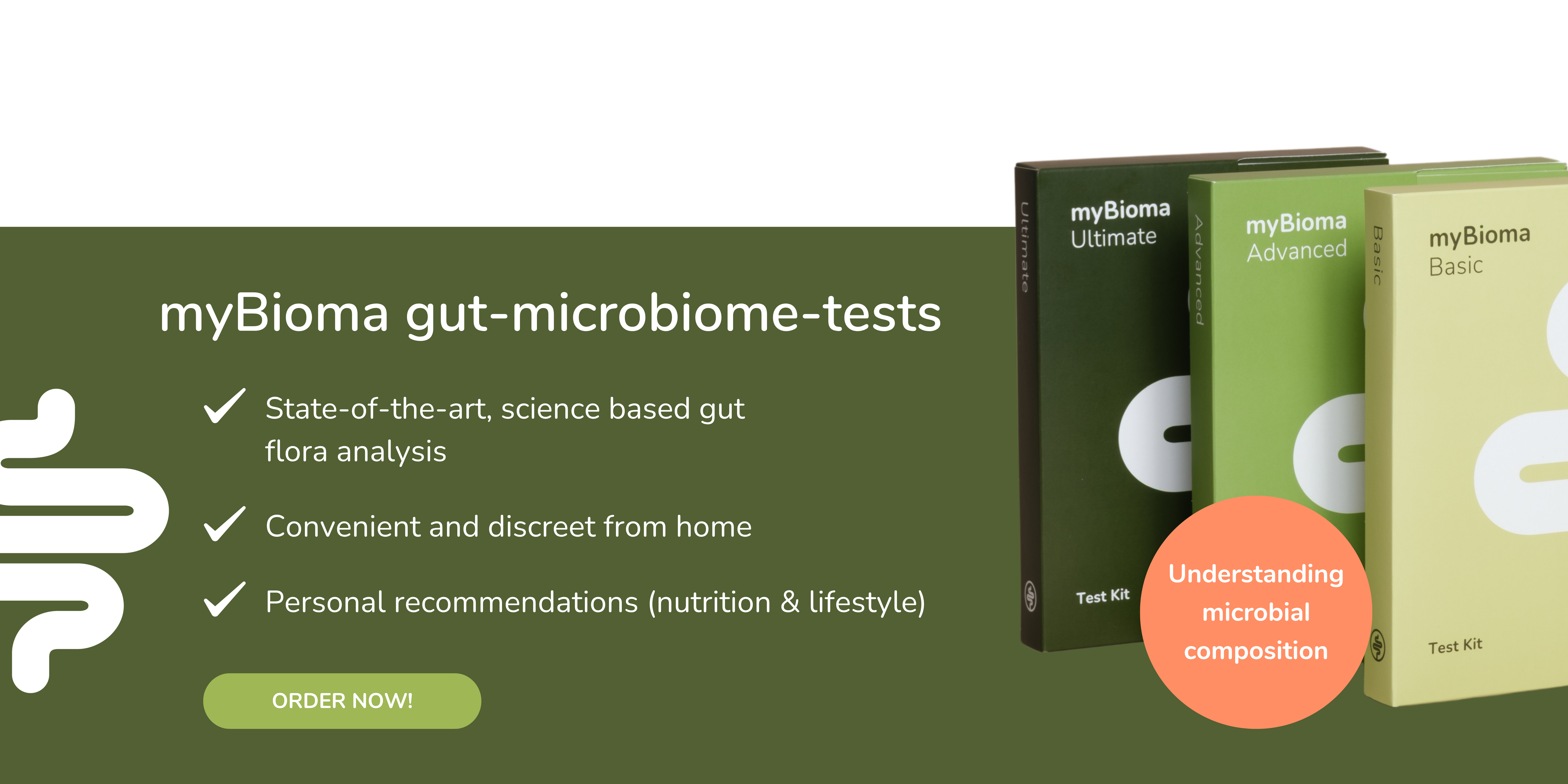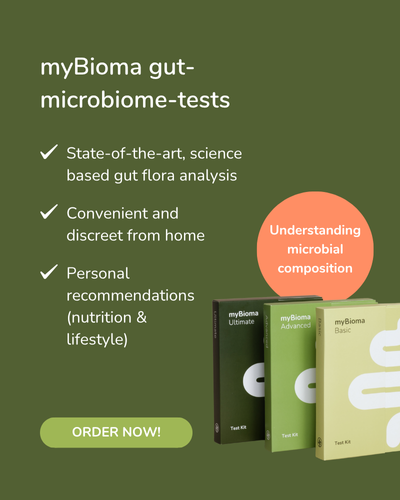Did you know that your gut communicates with your brain?
We know that our gut microbiome significantly influences our overall health and well-being. One of the most fascinating findings of recent research is how our gut influences our brain .
Gut-brain communication
Science has long discovered that our brain communicates with our gut - and vice versa. One of the main pathways for this communication is a nerve that runs the length of our body and directly connects our body organs (including our intestines) to our brain (1). This is called the vagus nerve and acts as a highway through which the brain sends signals to the intestines and the intestines send signals to the brain. So it can happen that when we feel stressed or anxious, it really upsets us. The vagus nerve also senses what is happening in our intestines and sends signals to our brain. This causes the brain to respond to the signals, for example by stopping us from eating because we are full (1).
Until recently, scientists believed that this gut-brain communication only involved signals from our bodies. However, over the last decade, increasing evidence has come to light that the microorganisms in our gut are also involved in this gut-brain communication.
Our microbiome communicates with our brain
We now know that substances produced by our gut bacteria affect the way our gut talks to our brain. For example, when our intestinal bacteria produce the beneficial short chain fatty acids (SCFA) butyrate and propionate, these stimulate our intestinal cells to produce appetite-suppressing hormones (2) and serotonin (3). These are both able to activate the vagus nerve in our gut to send signals to our brain (4). There is also evidence that some types of gut bacteria can directly produce the neurotransmitters dopamine, norepinephrine, serotonin and GABA (5).
"As research in this area advances, scientists are discovering more and more connections between the gut microbiome and our brain health."
Research in mouse models has shown that the gut microbiome is likely involved in brain development, social behavior, cognition, and neuroinflammation (6-8). Studies have also shown differences in the intestinal microbiome of healthy people compared to people with neurodegenerative diseases (9) and mental disorders. When scientists transplanted the stool of people with major depressive disorder into mice, the mice began to exhibit depression-like behaviors (11).
Diet can influence the communication between the gut and the brain
Interestingly, research also suggests that the primary substances produced by bacteria when consuming fiber, the SCFAs butyrate, propionate and acetate, likely play an important role in mediating communication between the gut and brain (12). For example, mice treated with SCFAs before exposure to long-term stress had reduced depressive/anxious behavior and improved intestinal barrier compared to mice that did not receive SCFAs (13). Another study showed that a high-fiber diet led to increased production of SCFAs and reduced neuroinflammation in aging mice (14). These effects on the brain remain to be confirmed in humans, but we know that SCFAs also play many important roles in the gut, such as maintaining the intestinal cell barrier, preventing inflammation, regulating appetite, and promoting serotonin production (15 ).
"A good strategy for improving brain and gut health is to make sure your diet includes lots of different sources of fiber, such as whole grains, fruits, vegetables, legumes, nuts and seeds."
By the way, we at myBioma have created an entire recipe book with which you can feed your intestinal bacteria in a “species-appropriate” way. Find out more about: Microbiome food – recipes for your intestinal bacteria .
Although we are only at the beginning of our journey to unravel how the gut microbiome influences our brain, the latest findings suggest that this is an area that holds promise for developing future options for treating neurodegenerative diseases and mental disorders is.
Take control of your gut health
The gut microbiome impacts our overall well-being and plays a crucial role in mental health. By regularly checking your microbiome, you can find out what your gut health is like and take steps to maintain or optimize your health. With myBioma You can test your intestines from the comfort of your own home and receive personal nutritional recommendations based on your results. Try it now!
References
- Breit, S., Kupferberg, A., Rogler, G. & Hasler, G. .Vagus Nerve as Modulator of the Brain-Gut Axis in Psychiatric and Inflammatory Disorders. Front. Psychiatry 9, 44–44 (2018).
- Larraufie, P. et al. SCFAs strongly stimulate PYY production in human enteroendocrine cells. Sci. Rep. 8, 74 (2018).
- Yano, J. M. et al. Indigenous bacteria from the gut microbiota regulate host serotonin biosynthesis. Cell 161, 264–276 (2015).
- Mohajeri, M. H., La Fata, G., Steinert, R. E. & Weber, P. Relationship between the gut microbiome and brain function. Nutr. Rev. 76, 481–496 (2018).
- Clarke, G. et al. Minireview: Gut microbiota: the neglected endocrine organ. Mol. Endocrinol. Baltim. Md 28, 1221–1238 (2014).
- Desbonnet, L. et al. Gut microbiota depletion from early adolescence in mice: Implications for brain and behaviour. Brain. Behav. Immun. 48, 165–173 (2015)
- Borre, Y. E. et al. Microbiota and neurodevelopmental windows: implications for brain disorders. Trends Mol. Med. 20, 509–518 (2014).
- Erny, D. et al. Host microbiota constantly control maturation and function of microglia in the CNS. Nat. Neurosci. 18, 965–977 (2015).
- Roy Sarkar, S. & Banerjee, S. Gut microbiota in neurodegenerative disorders. J. Neuroimmunol. 328, 98–104 (2019).
- Dinan, T. G., Stilling, R. M., Stanton, C. & Cryan, J. F. .Collective unconscious: How gut microbes shape human behavior. J. Psychiatr. Res. 63, 1–9 (2015).
- Sampson, T. R. et al. Gut Microbiota Regulate Motor Deficits and Neuroinflammation in a Model of Parkinson’s Disease. Cell 167, 1469-1480.e12 (2016).
- Zheng, P. et al. Gut microbiome remodeling induces depressive-like behaviors through a pathway mediated by the host’s metabolism. Mol. Psychiatry 21, 786 (2016).
- Dalile, B., Van Oudenhove, L., Vervliet, B. & Verbeke, K.. The role of short-chain fatty acids in microbiota–gut–brain communication.
- Nat. Rev. Gastroenterol. Hepatol. 16, 461–478 (2019).
- van de Wouw, M. et al. Short-chain fatty acids: microbial metabolites that alleviate stress-induced brain–gut axis alterations. .J. Physiol. 596, 4923–4944 (2018).
- Matt, S. M. et al. Butyrate and Dietary Soluble Fiber Improve Neuroinflammation Associated With Aging in Mice. Front. Immunol. 9, 1832 (2018).
- Koh, A., De Vadder, F., Kovatcheva-Datchary, P. & Bäckhed, F. From Dietary Fiber to Host Physiology: Short-Chain Fatty Acids as Key Bacterial Metabolites. Cell 165, 1332–1345 (2016).










